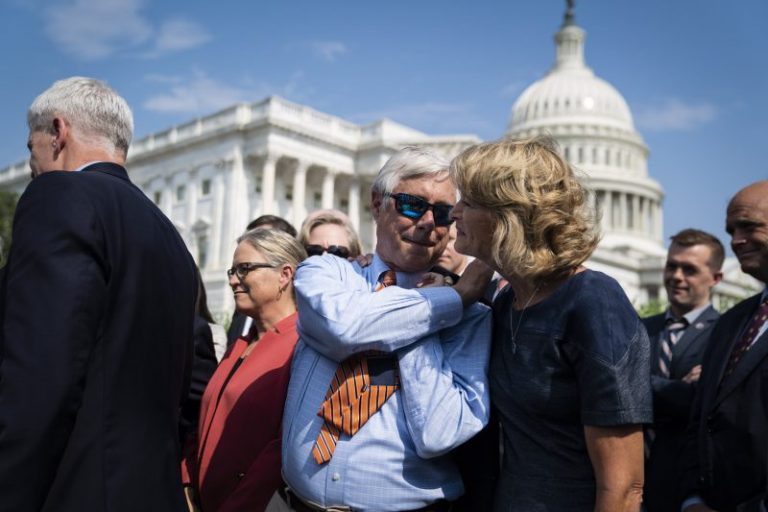For about as long as Kevin McCarthy’s ascent to House speaker has been in doubt, he and his allies have invoked a nightmare scenario for the ultraconservative House Freedom Caucus: If they thwart him, a handful of Republicans could join with Democrats to pick a moderate GOP speaker.
The play is obvious. They want the Freedom Caucus to fall in line for fear of this outcome, however plausible or implausible. And the man some have floated as the would-be speaker in this scenario, former congressman Fred Upton (R-Mich.), now says he’s interested.
That potential outcome still seems a long way off. But even as the House was descending into chaos on Tuesday, another House — Pennsylvania’s — shocked political watchers by forming a very similar coalition to elect its new speaker.
There are key differences between the two, but given the apparent difficulty of finding a Republican who could earn enough GOP votes, it’s worth taking stock of what happened in the Keystone State and whether it could be replicated at the federal level.
The bare bones, via the Philadelphia Inquirer:
Democrats won a slight majority of state House seats in November’s election, 102-101, but one of their candidates died and two others won other offices. That temporarily changed the balance of power, leaving Republicans with a 101-99 majority when a speaker was due to be elected.Republicans tried to force a vote for speaker shortly after the House convened Tuesday. Democrats objected, and the two sides huddled.When the session reconvened, the chief clerk moved to adjourn. But Republicans objected, wanting to use their temporary advantage to elect a GOP speaker. A vote deadlocked at 100-100, meaning the House remained in session.About 4 p.m. Eastern, Republican state Rep. Jim Gregory stepped forward to nominate Democratic state Rep. Mark Rozzi for speaker. (The two, both survivors of sexual abuse, have worked together on childhood abuse issues.) Democrats had previously designated another lawmaker, Joanna McClinton, as their pick for the job, but McClinton then endorsed Rozzi.Rozzi wound up receiving the votes of 16 Republicans, including outgoing speaker and now-Majority Leader Bryan Cutler, and winning the speakership 115-85.After the vote, Rozzi announced he would become an independent.
There are real questions about what happens from here. Democrats could try again to install McClinton after they fill the three vacancies in Democratic districts next month. But for now, the Pennsylvania House is effectively a coalition government, with an independent speaker and what will likely soon be 101 members of each party.
And all who voted for the speaker got something they wanted. The 16 Republicans got a moderate Democrat-cum-independent installed as speaker even though they won fewer seats in November, while Democrats avoided allowing the temporary GOP majority to put constitutional amendments they opposed (including stricter voter ID) on the statewide ballot.
So could something like this happen in the U.S. House?
The dynamics aren’t quite the same. While very narrow, the U.S. House GOP’s majority is larger (10 seats), meaning Democrats need more than one or two Republican defectors. There is also no imminent Democratic majority around the corner — a factor which undoubtedly helped persuade some Pennsylvania Republicans to go along with choosing a moderate while they could.
These kinds of things also tend to happen more often at the state level — including in Pennsylvania in 2007 — because the stakes are lower and independence from your party is more common. Republicans voting for a Democrat would be pretty unfathomable at the federal level; it would be tantamount to those members sacrificing their political careers.
But that doesn’t foreclose the possibility of enough congressional Republicans joining with Democrats to pick a moderate Republican speaker. That would be a somewhat easier sell for Republicans in competitive districts; they could argue that Congress deadlocked on the speaker vote, and they did what it took to get the chamber in motion. They’d still have to contend with primary challenges, in all likelihood — but you can see enough Republicans, including potential retirees, deciding this is a vote worth taking.
In the end, though, it’ll probably be some time before it would ever get to that point. It would most likely only happen after the party failed to find someone who could win with only Republican votes. That’s the preferable outcome for basically every Republican involved. And politicians don’t like to stick their necks out until they’ve exhausted the more expedient options — which in this case would include letting the process play out as long as they could, or opting for a more conservative speaker candidate they might not love.
All of that said, that outcome seems more plausible than it did 24 hours ago. And at this point, it would be political malpractice if Democrats weren’t at least exploring the possibility.

